Content from the Brookings Doha Center is now archived. In September 2021, after 14 years of impactful partnership, Brookings and the Brookings Doha Center announced that they were ending their affiliation. The Brookings Doha Center is now the Middle East Council on Global Affairs, a separate public policy institution based in Qatar.
All signs indicate that Algeria’s June 12 elections will not lead to any substantial change or reform, and will instead be used by the regime as a tool to reclaim some form of legitimacy, says Yasmina Abouzzohour. This article was originally published by Al Jazeera.
On June 12, a snap election will be held in Algeria to elect 407 members to the People’s General Assembly, the lower house of the country’s parliament.
The vote was initially scheduled to take place in 2022, but President Abdelmadjid Tabboune moved the election date forward in response to ongoing anti-government protests in the country.
A protest movement, known as Hirak, emerged in Algeria in 2019 in response to the announcement of then-President Abdelaziz Bouteflika’s candidacy for a fifth presidential mandate. Weekly mass protests led Bouteflika, who had been in power since 1999, to step down in April 2019. Bouteflika’s departure from the political scene, however, did not mark the end of this grassroots movement. Protesters continued to regularly take to the streets, this time demanding a complete overhaul of the political system, which – notably – would involve the distancing from the political sphere of the country’s all-powerful military.
The Hirak movement’s protests largely came to a halt in March 2020 due to the COVID-19 pandemic. However, the protests returned with full force in February 2021, after the country managed to bring the outbreak under relative control.
In recent months, the economic fallout from COVID-19 and the fall in oil prices led to a rise in unemployment and a significant decrease in the buying power of Algerians, heightening further protests. The government’s recent crackdown on dissenting voices, including members of the Hirak movement, also increased unrest.
The military leadership, which is unwilling to concede to the public’s demands for a truly civil and democratic state, has attempted to contain the unrest through varying levels of repression as well as political tactics such as a constitutional amendment in 2020. And the upcoming snap legislative election is another effort by the military-controlled regime to ease tensions.
However, the Hirak movement and many political actors in Algeria swiftly rejected the show election. And, as demonstrated by ongoing protests and growing public criticism of the state, a significant portion of the Algerian population seems to agree.
As a result, a majority of the population is expected to boycott the upcoming election. Moreover, despite promises to remain neutral, the military will likely have a say in which parties rise to power after the election. In Algeria, it is still very difficult to imagine a scenario in which a party wins the majority against the wishes of the military. It is even more improbable that, following the election, the power dynamics in Algeria will change so far as to allow any political actor or body to challenge or check the military’s significant powers. Consequently, it is highly unlikely for the June 12 election to instigate any real change in the country.
An opportunity for Islamists?
About 24 million eligible voters are called to vote on Saturday to elect a new lower house of parliament for a five-year mandate. There are 1,483 electoral lists; 646 of these were submitted by political parties and 837 by independents. Of the 22,554 candidates, 10,468 are from political parties while 12,086 are independent. The number of independent candidates is higher than that of candidates from political parties – a first in Algeria’s history.
Given that they are viewed as pro-regime and are considered by the popular movement to be partly responsible for the ongoing political and economic crises, established parties such as the National Liberation Front (FLN) and the Democratic National Rally (RND) will probably earn fewer votes than they did in the 2017 legislative election. Whether they will lose their share of influence in parliament, however, will depend on the performance of other, smaller parties. Especially, the performance of Algeria’s Islamist parties will likely determine the makeup of the next parliament and government.
Islamist parties have long been struggling to win popular support in Algeria. In 1992, the military dismantled the Islamic Salvation Front (FIS), an Islamist political party, when it became clear that it was on course to win the general election. The move triggered a bloody civil war, which lasted until 2002, and caused an estimated 200,000 deaths. The legacy of this bloody civil war pushed Islamists to the margins of Algeria’s political sphere, leaving them without much opportunity to reclaim power.
The ongoing unrest, coupled with the regime’s crisis of legitimacy and the lack of a credible alternative, however, could present Islamist parties with an opportunity to gain more influence in parliament after Saturday’s election.
Nevertheless, the Islamist parties may still struggle to seize this moment of opportunity and maximize their votes. Throughout their election campaigns, Islamist parties tried to appeal to non-Islamist and less radical voters. This may cause them to lose the support of some of their core voters, namely “radical Islamists”, in the upcoming election. Furthermore, some Islamist parties have expressed their desire to work with the regime to bring about change, which could result in them losing the support of voters who want the regime’s departure. These parties may also be hurt by the very fact that they have not rejected these elections or have been in government in the past.
For example, the Movement of Society and Peace (MSP) which is allied with the Muslim Brotherhood – whose leader Abderrazak Makri recently said his party is ready to govern and has good relations with the authorities – has continuously participated in government between 1997 (Algeria’s first post-civil war parliamentary elections) and 2011. The head of the El-Binaa party, Abdelkader Bengrina, who came second behind Tebboune in the 2019 presidential election, meanwhile, has used his campaign platform to call for reconciliation and moving past the civil war.
These parties may still earn enough votes to lead the lower chamber of parliament. However, they are unlikely to pursue the radical reform agenda sought by the Hirak movement.
Thus, they do not constitute a threat to the regime. In fact, President Tebboune recently said he is not bothered by these parties’ moderate Islamic ideology and that he is ready to work with them. Therefore, if Islamist parties end up forming Algeria’s new government, they would most likely be in a similar position to neighboring Morocco’s Justice and Development Party, which was previously in opposition but has since bowed to the regime.
The big picture
All signs indicate that Algeria’s June 12 elections will not lead to any substantial change or reform, and will instead be used by the regime as a tool to reclaim some form of legitimacy.
But the regime’s apparent plans to treat the election result as a stamp of approval is complicated by the expected low voter turnout. Many Algerians have been boycotting elections in recent years – the 2019 presidential election had a 40 percent turnout, while the 2020 referendum to the constitution had a record-low 24 percent turnout. With the Hirak movement and several left-wing and Amazigh political parties rejecting the election, the voter turnout on Saturday will also likely be low.
This will be a problem for the regime which not only aims to placate the popular movement through the election of a new lower chamber of parliament, but also seeks to create the impression that it has the support of the Algerian people. It will likely find itself unable to do either, as political actors and citizens alike are aware that this election is part of the regime’s illusionary liberalization strategy and that the military leadership would never allow true democratization.
Regardless of which parties come on top in the election or what type of coalition is formed in its aftermath, there are two takeaways.
First, true power will remain in the hands of the military. As a result, any future reform will most likely be cosmetic, aiming to entrench the regime’s powers while appeasing protesters.
Second, the Hirak movement will persevere, and the majority of its members will remain uncompromising. Demands for regime change will not simply disappear, and the military leadership will not genuinely concede to these demands in the near future. The ongoing impasse will therefore persist, leaving repression as the main outcome. Whereas both sides had initially shown restraint in using violence to avoid a repeat of the 1990s’ civil war, the regime has recently resorted to harsh crackdowns, and may continue to do so if a compromise is not reached.
The Brookings Institution is committed to quality, independence, and impact.
We are supported by a diverse array of funders. In line with our values and policies, each Brookings publication represents the sole views of its author(s).
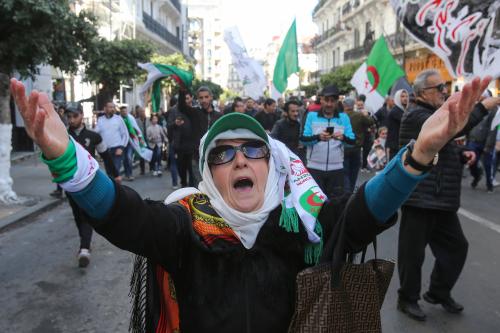
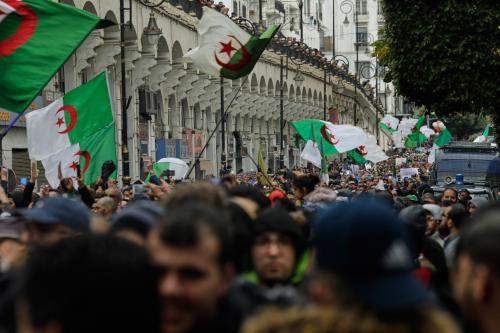
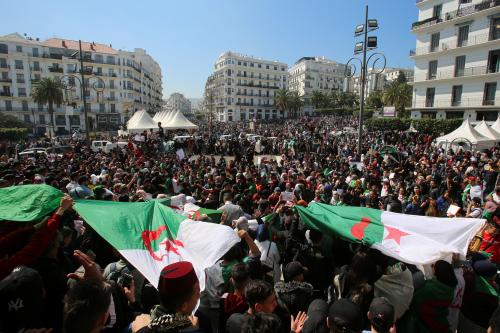
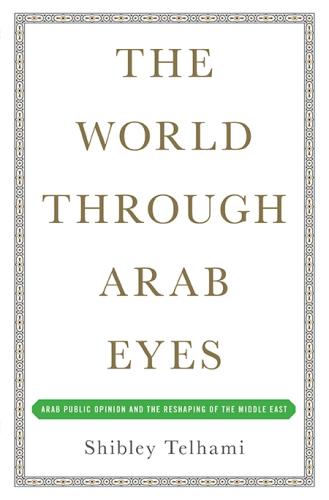

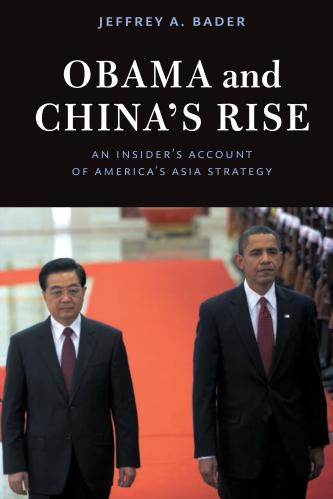




Commentary
Op-edAlgeria’s upcoming election will not instigate meaningful change
Friday, June 11, 2021